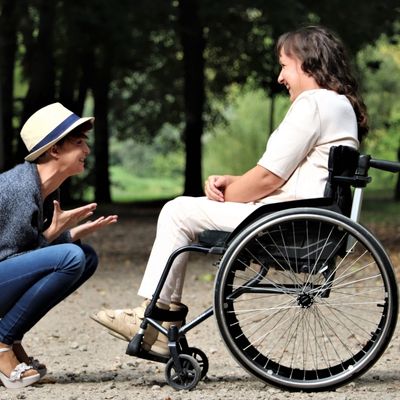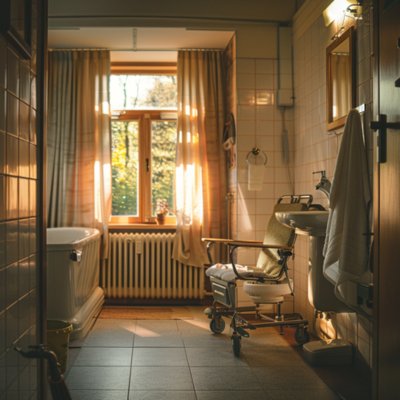In the realm of patient care and mobility assistance, the choice between ceiling lifts and floor-based patient lifts can significantly impact both patient comfort and caregiver efficiency. As healthcare facilities and home care providers strive to enhance patient mobility while ensuring caregiver safety, understanding the nuances of these lift systems becomes crucial. This comprehensive guide will explore the pros and cons of ceiling lifts and floor-based lifts, helping you make an informed decision for your specific care environment.
Understanding Patient Lifts: A Gateway to Enhanced Mobility and Safety
Patient lifts are essential tools designed to safely transfer individuals with limited mobility between locations such as beds, chairs, toilets, or bathtubs. These devices not only enhance patient dignity and comfort but also play a vital role in preventing caregiver injuries associated with manual lifting.
The Evolution of Patient Lifts: From Floor-Based to Ceiling-Mounted Solutions
The journey of patient lifts from their inception to modern-day innovations reflects the ongoing commitment to improving both patient care and caregiver safety.
Traditional Approaches
- Manual floor-based lifts
- Limited weight capacities
- Higher risk of caregiver strain
- Primarily used in institutional settings
Modern Innovations
- Motorized ceiling lift systems
- Increased weight capacities
- Reduced physical strain on caregivers
- Adaptable for various care environments
- Advanced safety features and controls
Key Features and Considerations of Patient Lifts
Essential Factors to Consider When Choosing Between Ceiling and Floor-Based Lifts
- Installation Requirements: Permanent vs. portable options
- Weight Capacity: Ranging from 300 to 1000+ lbs
- Spatial Impact: Overhead systems vs. floor space utilization
- Versatility: Fixed tracks vs. mobile units
- Initial Costs: Higher for ceiling lifts, lower for floor-based
- Long-term Efficiency: Reduced strain and faster transfers with ceiling lifts
- Patient Comfort: Smoother transfers with ceiling systems
- Maintenance Needs: Regular checks for both types
Spotlight on Innovative Patient Lift Solutions

Bestlift PL350CT Full Body Patient Lift
This floor-based lift offers versatility and ease of use, perfect for various care settings.
- 350 lb weight capacity
- Compact and maneuverable design
- Foldable for easy storage and transport
- Suitable for home and institutional use

Bestcare Power Patient Lift 400/HE
A robust floor-based lift offering power and precision for demanding care environments.
- 400 lb weight capacity
- Electric operation for smooth lifts
- Ergonomic design for caregiver comfort
- Versatile for various transfer situations
Patient Lifts in Various Care Settings
1. Home Care Environments
In home care settings, the choice between ceiling and floor-based lifts often depends on the long-term care needs and home layout. Ceiling lifts can be ideal for dedicated care spaces, offering a clutter-free solution. However, floor-based lifts provide flexibility for temporary or changing needs.
2. Hospitals and Acute Care
Hospitals often benefit from a combination of both lift types. Ceiling lifts are preferred in high-use areas like intensive care units, while floor-based lifts offer flexibility for general wards and temporary use.
3. Long-Term Care Facilities
Long-term care facilities may opt for ceiling lifts in residents' rooms for frequent transfers, complemented by floor-based lifts for common areas and specialized care needs.
For more insights on how patient lifts are used in different healthcare settings, explore our article on Patient Lifts in Institutional Settings: Hospitals, Nursing Homes, and Rehabilitation Centers.
Challenges and Strategies for Improvement
While patient lifts significantly enhance care, there are challenges to address:
Installation Complexity
Ceiling lift installation can be complex and may require structural modifications.
Cost Considerations
High initial costs for ceiling lifts can be a barrier for some care providers.
Training Requirements
Proper training is essential for safe operation of both lift types.
Maintenance Needs
Regular maintenance is crucial for ensuring long-term safety and efficiency.
Strategies for addressing these challenges include:
- Developing modular ceiling lift systems for easier installation
- Offering flexible financing options to offset initial costs
- Implementing comprehensive training programs and ongoing education
- Establishing regular maintenance schedules and easy-to-follow protocols
Choosing the Right Patient Lift: A Personalized Approach
Selecting the appropriate patient lift depends on various factors. Consider the following when making your choice:
For more detailed guidance on selecting the right patient lift for various situations, explore our article on Choosing the Right Patient Lift for Home Use: A Comprehensive Guide.
Maintenance and Care for Patient Lifts
Proper maintenance of patient lifts is crucial for ensuring their longevity, safety, and continued functionality. Here are some essential care tips:
- Regular Inspections: Conduct visual checks before each use and more thorough inspections monthly.
- Cleaning: Clean lift surfaces and slings regularly according to manufacturer guidelines.
- Lubrication: Keep moving parts well-lubricated, especially for floor-based lifts.
- Battery Care: For electric lifts, follow proper charging procedures and replace batteries as recommended.
- Professional Servicing: Schedule annual professional inspections and servicing, particularly for ceiling lift systems.
For a comprehensive guide on lift maintenance, refer to our article: Patient Lift Maintenance: Essential Tips for Longevity and Safety.
Conclusion: Balancing Needs for Optimal Patient Care
The choice between ceiling lifts and floor-based patient lifts is not a one-size-fits-all decision. Each option offers unique benefits and considerations that must be weighed against the specific needs of the care environment, patient requirements, and caregiver capabilities.
Ceiling lifts excel in providing a clutter-free solution with smooth transfers and reduced caregiver strain, making them ideal for long-term, high-use scenarios. Floor-based lifts offer flexibility and lower initial costs, proving valuable in diverse care settings and for temporary needs.
Ultimately, the goal is to enhance patient dignity and safety while ensuring caregiver well-being. By carefully considering the factors outlined in this guide, care providers can make informed decisions that optimize patient care, improve operational efficiency, and create safer working environments for caregivers.
As patient lift technology continues to evolve, we can expect to see even more innovative solutions that bridge the gap between ceiling and floor-based systems, offering the best of both worlds for enhanced patient mobility and care.
Ready to Find Your Ideal Patient Lift Solution?
Explore our range of ceiling and floor-based patient lifts to find the perfect fit for your care needs. Our expert team is ready to help you navigate the options and choose the best solution for your specific requirements.
Shop Patient Lifts Now








